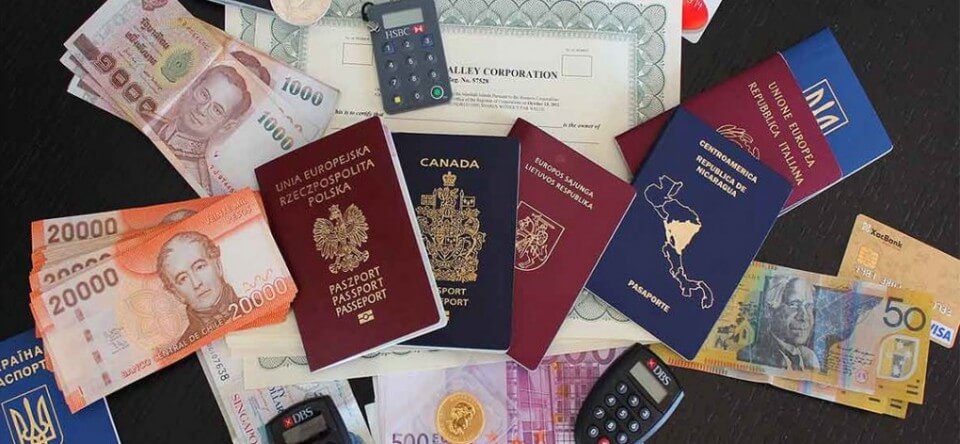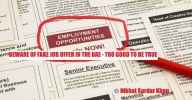Legal blog
Committing Forgery in Official Documents and its Consequences in the UAE

Working in the UAE is the dream of many people from other countries, but getting a job is not easy. It requires some money and proper documents. A passport, visa, medical check-up, and education certificates are just a few of the requirements needed to secure a job. While the process can take time, it does not deter job seekers from coming and looking for work in the UAE.
Many job seekers, however, either individually or through intermediaries, falsify documents. The most common types of fraud are found in education certificates, medical check-up certificates, and even passports and visas. The penalties for forging or using false documents can be severe and include imprisonment and fines. Therefore, it is very important for job seekers or employers to understand and know the consequences, risks and legal sanctions of forging or using false documents to work or live in the UAE.
Employers can warn prospective workers not to try to falsify or use false documents when applying for jobs at their company in order to avoid legal problems in the future. The phenomenon of falsifying or using false documents still occurs even though the law has been tightened and legal sanctions and penalties have become stricter.
Definition of Forgery
The general meaning of “forgery” in the dictionary is as follows:
a. Forgery is committed when a person makes or alters writing so that it is false with the intent to defraud.
b. Forgery is a white-collar crime that generally refers to the false making or material alteration of a legal instrument with the specific intent to defraud anyone (other than themselves).
c. A person who makes, utters, or alters writing in such a way as to convey a false impression concerning its authenticity imposing a legal liability with the purpose of deceiving or injuring another is guilty of forgery in its contemporary sense.
Forgery under the UAE Law
The UAE Penal Code No. 3 of 1987 organizes forgery in Chapter Five, Section One under “Forgery and counterfeiting of seals, mark and stamps” from article 211 to Article 215 and Section Two under “Forgery of instruments” from article 216 to article 223. On this occasion, we will discuss the forgery of written instruments.
Article 216 of the Federal Penal Code states that “Forgery of an instrument is to alter its reality in one of the manners described hereinbelow, so as to cause prejudice, with the intention of substituting the false for the genuine instrument”. The provisions of Article 216 of The Federal Penal Code can be formulated as follows:
a. Forgery;
b. A written instrument;
c. To alter its reality in one of the manners described hereinbelow;
d. So as to cause prejudice with the intention of substituting the false for the genuine instrument.
By formulating the provisions of article 216 of The Federal Penal Code, it is easier to classify and understand the elements of a criminal offence from an act of forged documents. But these elements do not always stand alone as a whole. The explanation and definition of forgery in general and in accordance with the provisions of the Federal Penal Code have been explained as mentioned above.
What Does "A Written Instrument” Mean?
a. A written instrument is a document that states some contractual relationship or grants some right, example: assignment, conveyance.
b. A written instrument is something set down in writing.
c. A written instrument is anything expressed in writing a contract or agreement contained in the writing. Many statutes are required to be expressed in writing in order for them to take effect.
d. A written instrument is a paper document, or other instrument containing written or printed matter or the equivalent thereof, used for purpose of reciting, embodying, conveying, or recording information, and any money, token, stamp, seal, badge, or trademark or any evidence or symbol of value, right, privilege or identification, that is capable of being used to the advantage or disadvantage of another.
So the meaning of “a written instrument” is writing or printing something on paper, work paper, document, letter, license, certificate... etc., as a tool to provide information or fact for the purpose in daily life. “An official written instrument” pursuant to article 218 of The Federal Penal Code states that: “An official written instrument is the one which is written by a public official who, by virtue of his position is charged with the writing thereof or interfering in its writing in any form or to give it the official character. Other written instruments are considered informal”.
Based on the provisions of Article 218 of The Federal Penal Code, there are two types of documents that can be the object of forgery:
a. Official or Public Document: An official or public document is a letter made formally and is used for formal or official purposes by certain parties, whether individuals, institutions, official agencies or organizations. Example: certificate, permit, bill of indictment, passport, visa and id card.
b. Informal Document: Informal documents are letters made illegally using the non-standard or non-formal language for personal gain. Example: love letters, letters from family or friends.
Documents that can be used as objects for forgery are:
a. Written documents that can give rise to a right for the party using it, such as a ticket, certificate, coupon... etc.
b. Written documents that can exempt an agreement or debt exemption such as receipts, cheques... etc.
c. Written documents that can issue an agreement such as a lease agreement, sale or purchase agreement, prenuptial agreement... etc.
d. Written documents that provide information about an event or action, such as a birth certificate, domicile certificate, and bonds.
False documents are documents whose contents in whole or in part contradict the law, the truth and the actual facts, either in a substantial or material perspective. The sample of “a written instrument” are documents, letters, data, art papers, contracts, id cards, certificates, legal documents, bills or notes... etc. A written instrument is an act that is not prohibited by law but becomes an act that violates criminal law if the purpose of writing is to change the contents and fact of truth illegally or to not have the legal authority to do so.
The Seven Conditions of Forgery
What is meant by the phrase “to alter its reality in one of the manners described hereinbelow”? How to know if “a written instrument” is included in the category of a document forgery based on the UAE Law?
In the provisions of article 216 of the Federal Penal Code, the following seven “Forging Methods” have been regulated:
1. Effecting a change in an existing written instrument whether by way of addition detention or alteration in its words, numbers, marks or pictures present in it;
2. Putting up a forged signature or seal or changing a genuine signature, seal or thumbprint;
3. Obtaining by surprise or fraud the signature, seal or thumbprint of a person without his knowledge of the contents of the instrument or without his/her valid consent thereto;
4. Fabricating a written instrument or imitating it and attributing it to another person;
5. Filling a paper signed, sealed or thumb-printed in a bank without the consent of the author of the signature, seal or thumbprint;
6. Impersonating or exchanging the identity in a written instrument made to establish such an identity;
7. Alternation of the truth in a just-made instrument as to concern matters that this instrument is designed to establish.
If an action “a written instrument” fulfils one of the seven methods of forgery listed above, then that action can be categorized as “Forging.”
The Role of Prejudice in Forgery
What is meant by the phrase “to cause prejudice with the intention of substituting the false for the genuine instrument” in article 216 of The Federal Penal Code?
The definition of the sentence “ to cause prejudice” are:
a. An act to make or cause or create a perception, opinion, idea, a biased state;
b. A bias or a preconceived opinion, idea or belief about something;
c. A person’s upbringing may cause them to become prejudiced.
If a parent had prejudices of their own, there is a chance that this opinion will be passed on to the next generation. The act of “to cause prejudice” is not an act against the law if it is not accompanied by aims and objectives that are against the law. The definition of “intention” is:
a. It is something that you want and plans to do.
b. It is a determination to act in a certain way.
c. It is the resolve or design with which a person does or refrains from doing an act, a necessary ingredient of certain offences.
The meaning of the sentence “to cause prejudice with the intention of substituting the false for the genuine instrument” pursuant article 216 of The Federal Penal Code is an act of falsification carried out by creating an opinion or perception or picture of feeling or thought or situation to make other people believe something is a genuine instrument.
Sanctioned Actions of Forgery
Actions of forgery that can be subject to criminal sanctions are as follows:
1. Actions which fulfil the elements partially or completely of the seven methods of forgery in the provision of article 216 of The Federal Penal Code;
2. The forgers have the intention or intention to create or use false documents for personal or other people’s interests with the aim of making other people believe that the false documents are genuine and/or to obtain profit from the false documents;
3. The forgers have full awareness and there is no pressure or coercion from other parties in falsifying documents or using the false documents;
4. The forgers understand or know that making false documents by modifying, changing, or plagiarizing is against criminal law;
5. The forgery action may cause direct or indirect loss, meaning that there is a possibility of loss due to the forgery of the document.
Using or making letters is not prohibited by law, but the purpose of making or using the false documents as stipulated in article 216 of The Federal Penal Code are illegal acts that can be subject to imprisonment. The act of forging an official written instrument can be subject to imprisonment for ten years and for forging an informal written instrument subject to detention sanctions as stipulated in article 217 of The Federal Penal Code:
“Unless otherwise provided, forging an official written instrument shall be sanctioned by imprisonment for a term not exceeding ten years and the penalty as concerns forging an informal instrument shall be detention”.
The act of using a false official written instrument will be subject to maximum imprisonment for five years and also the sanctions for 5 years apply equally to the person who gets the benefit of forging an official instrument as stipulated in Article 217/1 (1) of The Federal Penal Code:
“...Shall be sentenced to imprisonment for a maximum period of five years, whoever forges a copy of an official written instrument when used.”
The same penalty shall be inflicted upon whoever utilizes a copy of an official written instrument knowing that it is forged. For example, a person has a high school education wants to apply for a marketing job at a real estate company in Dubai but the requirement must have a bachelor degree certificate. Then the person asks a printing employee to make a bachelor degree certificate by plagiarizing of bachelor degree certificate from one of the universities in his country, so he can apply for a marketing job at real estate company in Dubai.
The printing employee agreed to make an imitation of the bachelor degree certificate, so his action has fulfilled the seven methods of forging, namely without having the authority to make that certificate by copying, attaching, adding, printing, stamping, seal, logo, writing, signature with the name of the person on a false bachelor degree certificate has been prepared so that false certificate can change the person's educational status as a graduate.
This article was appended to the Penal Code pursuant to the Federal Law No 34 of 2005. The action of the person is clearly prohibited by law and fulfilled the elements of forging acts as in article 216 of The Federal Penal Code and his acts that can be subject to imprisonment for 10 years as stipulated in article 217 of Federal Penal Code. From the beginning, the action of that person is clear that he has an intention and purpose of using a false bachelor degree certificate for him and will use it to apply for a marketing job at a real estate company in Dubai.
In this case, the person does not make a false certificate for himself but he asked the printing employee to make it for him and will be used according to his plan, here are some questions?
1. Has the act of the person fulfilled the elements partially or completely of the seven methods of forgery in the provision of article 216 of The Federal Penal Code?
2. Can the act of the person be subject to an accumulated criminal act?
3. For how long will the person be subject to imprisonment and based on which article of The Federal Penal Code?
Conclusion
The forgery of a written instrument or using it regardless of the situation and reason must be avoided, especially for job seekers, employers, or businessmen who should never try to forge or use a false document in the UAE because of the consequences, risks, severe penalties and imprisonment that are not appropriate for the act of forgery.
Here are some tips especially for job seekers in the UAE to prevent and avoid document forgery. They are in order to prepare the completeness and legality of the documents needed to work in the UAE long before coming to the UAE:
1. Prepare financially to find a job or live in the UAE;
2. Conduct a medical check-up at an official and legal health clinic in the country of origin;
3. Made passport and visa documents in official and legal place in the country of origin;
4. Performing a degree certificate attestation among others (Notarization in the country of origin, attestation at the ministry of foreign affairs of state in the country of origin, certification by the UAE embassy or consulate in the country of origin, certification by the UAE Ministry of Foreign Affairs (MOFA), Arabic translation);
5. Improve the language skills of English and Arabic which are using for daily in the UAE;
6. Improve the skills that support work;
7. Have awareness for fraudulent modes that offer services or promising to get jobs, passports and visas at very low cost and fast processing;
8. Knowing and understanding the legal knowledge applied in the UAE.
Written by:
Abdul Wahied Mohammad Sharief | Dar Al Haqooq Legal Consultancy

This publication is for general information purposes only. It does not purport to provide comprehensive full legal or other advice.
Legal Advice Middle East and the contributors accept no responsibility for losses that may arise from reliance upon information contained in this publication. This publication is intended to give an indication of legal issues upon which you may need advice.
Full legal advice should be taken in due course from a qualified professional when dealing with specific situations.





